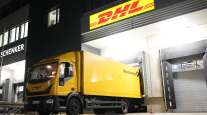European Logistics Operators Deutsche Post, DSV Boost First-Quarter Results

Two European logistics operators with a U.S. presence have reported higher first-quarter earnings by raising profit margins on businesses such as small parcels and ocean freight.
Deutsche Post DHL Group, operator of DHL brand Express and Global Forwarding, reported net income rose 22% to $706 million (639 million euros), or 59 cents, despite a drop of 6% in revenue to $16 billion.
Denmark’s DSV Group, which acquired UTi Worldwide earlier this year, raised net income 7%, excluding one-time costs, to $79 million (527 million Danish kroner).
The German company said that the express and global forwarding units produced strong growth, including a 32% rise in earnings before interest and taxes at the DHL businesses.
Profit on that basis tripled at the global forwarding and freight divisions despite lower revenue in the air and ocean freight businesses. Supply chain profitability more than doubled. The Americas account for about one-third of supply chain revenue.
DHL Supply Chain ranks No. 7 on the Transport Topics Top 50 list of the largest logistics companies in North America.
DHL Express profits improved 7.5% as revenue held steady.
“UTi contributed a loss in the first months of the year, but the existing DSV operations continued the positive development of 2015,” CEO Jens Bjorn Andersen said in a statement. “The acquisition of UTi has been a major theme in the first quarter of 2016. We have had a good start, and the [integration] process is proceeding according to plan. It is of the utmost importance that we take good care of our customers during this phase."
Uti ranks No. 11 on the Logistics 50. DSV Air & Sea is the No. 8 ocean freight forwarder listed in the Logistics 50.
Revenue rose more than 20% to $2.3 billion including UTi results after the completion of the acquisition Jan. 22. Excluding UTi, revenue fell 3.4%. Air and sea freight contributed 61% of the company’s profit before interest and taxes, which rose less than 1% excluding one-time costs.
One-time costs, largely for the UTi integration, totaled $54 million.



